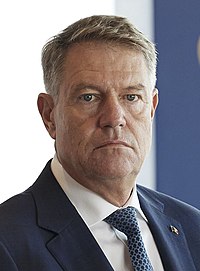
Back Klaus Iohannis Afrikaans Klaus Johannis ALS Klaus Iohannis AMI كلاوس يوهانيس Arabic Klaus Iohannis AST Klaus Yohannis Azerbaijani Klaus Johannis BAR Клаус Яханіс Byelorussian Кляўс Яганіс BE-X-OLD Клаус Йоханис Bulgarian
Klaus Iohannis | |
|---|---|
 Iohannis in 2022 | |
| President of Romania | |
| Assumed office 21 December 2014 | |
| Prime Minister | See full list |
| Preceded by | Traian Băsescu |
| Mayor of Sibiu | |
| In office 30 June 2000 – 2 December 2014 | |
| Preceded by | Dan Condurat |
| Succeeded by | Astrid Fodor |
| Leader of the National Liberal Party | |
| In office 28 June 2014 – 18 December 2014 | |
| Preceded by | Crin Antonescu |
| Succeeded by | Alina Gorghiu Vasile Blaga |
| Leader of the Democratic Forum of Germans in Romania | |
| In office 2002–2013 | |
| Preceded by | Eberhard Wolfgang Wittstock |
| Succeeded by | Paul-Jürgen Porr |
| Personal details | |
| Born | Klaus Werner Iohannis 13 June 1959 Sibiu, Romania |
| Political party | Independent (2014–present)[a] |
| Other political affiliations | Democratic Forum of Germans in Romania (1990–2013) National Liberal Party (2013–2014) |
| Spouse | |
| Residence | Cotroceni Palace |
| Education | Babeș-Bolyai University (BSc) |
| Signature |  |
| a. ^ PNL membership suspended while president[1] | |
Klaus Werner Iohannis (Romanian: [ˈkla.us joˈhanis], German: [ˈklaʊs joˈhanɪs]; also spelled Johannis; born 13 June 1959), sometimes referred to by his initials KWI in the Romanian press,[2][3] is a Romanian politician, physicist, and former physics teacher who has served as president of Romania since 2014. He became the president of the National Liberal Party (PNL) in 2014, after previously serving as the leader of the Democratic Forum of Germans in Romania (FDGR/DFDR) between 2002 and 2013. Prior to entering national politics, he was a physics teacher at the Samuel von Brukenthal National College in his native Sibiu.
He was first elected the mayor of the Romanian town of Sibiu, Transylvania in 2000, on behalf of the Democratic Forum of Germans in Romania (FDGR/DFDR). Although the German (more specifically Transylvanian Saxon) population of the once predominantly German/Transylvanian Saxon-speaking town of Sibiu had declined to a tiny minority by the early 2000s, he won a surprise victory and was re-elected by landslides in 2004, 2008, and 2012. He is credited with turning his home town into one of Romania's most popular tourist destinations, Sibiu subsequently obtaining the title of European Capital of Culture in 2007 alongside Luxembourg City, the capital of Luxembourg.
In October 2009, four of the five political groups in the Parliament, excluding the Democratic Liberal Party (PDL) of then President Traian Băsescu, proposed him as a candidate for the office of Prime Minister of Romania; however, Băsescu refused to nominate him despite the Parliament's adoption of a declaration supporting his candidacy.[4] He was again the candidate for Prime Minister of the PNL and the Social Democratic Party (PSD) in the elections in the same year.[5] In February 2013, He became a member of the National Liberal Party (PNL), accepting an invitation from then liberal leader Crin Antonescu, and was immediately elected the party's first vice-president, eventually becoming the PNL president during the following year.
Ideologically a conservative,[6][7][8][9] he is the first Romanian president belonging to an ethnic minority, as he is a Transylvanian Saxon, part of Romania's German minority, which settled in Transylvania beginning in the 12th century (as part of the Ostsiedlung process which took place during the High Middle Ages).[10] He was initially elected in 2014 and then subsequently re-elected by a landslide in 2019.
His late presidency (his second term) has been marked by democratic backsliding[11] as well as a slight shift towards illiberalism[12] and a more authoritarian[13] style of government, especially after the 2021 political crisis and the formation of the National Coalition for Romania (CNR).
- ^ Andi Manciu (18 December 2014). "Iohannis: Mi-am anunțat demisia din PNL. Mulțumesc pentru că am avut onoarea să fiu președintele PNL". Mediafax.ro (in Romanian).
- ^ "Klaus Iohannis, groparul democrației – Q Magazine". 10 November 2022.
- ^ Octavian Șerban (31 May 2023). "O coaliție pentru liniștea unui cetățean, KWI". Spotmedia.ro (in Romanian). Retrieved 14 June 2023.
- ^ "Romanian opposition demands new PM". Euronews. 21 October 2009. Archived from the original on 29 February 2012. Retrieved 16 November 2014.
- ^ "National minorities in Romania's Parliament support Mircea Geoana's candidacy for runoff presidential election – FINANCIARUL – ultimele stiri din Finante, Banci, Economie, Imobiliare si IT". 30 November 2009. Archived from the original on 10 January 2014. Retrieved 16 November 2014.
- ^ C, A. (21 November 2019). "HANDELSBLATT: Cu un preşedinte conservator, românii speră într-un viitor mai bun | Agenția de presă Rador". Retrieved 11 May 2023.
- ^ "Conservative Klaus Iohannis wins re-election as Romania's president". 26 June 2023.
- ^ "Exit Poll Shows Romania's Iohannis Wins 2nd Term in Runoff". VOA. 24 November 2019. Retrieved 11 May 2023.
- ^ "Surprise Presidential Victory for Romania's Klaus Iohannis". NDTV.com. Retrieved 11 May 2023.
- ^ Valentina Pop (17 November 2014). "Romanians elect first ethnic German president". EUobserver.
- ^ "Romania: Nations in Transit 2022 Country Report".
- ^ "Cei doi mari câștigători ai protestelor din 10 august". 11 August 2023.
- ^ "[P] Democrația moare în liniște. Cum instaurează triada Klaus Iohannis - Eduard Hellvig - Marcel Ciolacu un regim siloviki în România".
© MMXXIII Rich X Search. We shall prevail. All rights reserved. Rich X Search